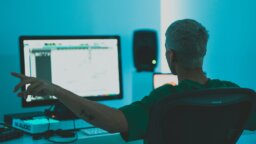At least two big artists have chimed in on all the “fake Drake” and artificial intelligence music controversy, sharing polarizing views, but both highlighting the importance of defending artists’ rights and copyrights.
The “fake Drake” AI controversy was brought to the forefront recently when a mysterious ‘artist’ called ghostwriter released a track featuring AI-replicated Drake ‘vocals.’
The track, heart on my sleeve, went viral, racking up more than 230,000 plays on YouTube, and more than 625,000 plays on Spotify before it was pulled down from music streaming services like Apple Music, Deezer and TIDAL. Spotify, SoundCloud, and YouTube also deleted the track from their platforms.
Universal Music Group recently issued a statement, noting that, DSPs “have a fundamental legal and ethical responsibility to prevent the use of their services in ways that harm artists”.
Former Genesis member Peter Gabriel, has openly discussed the advantage of using new technologies in music creation and other fields.
“I think you do better if you work with a powerful new tool than just grumble or pretend it doesn’t exist,” Gabriel said in an interview with Uncut magazine last month.
Gabriel most recently defended a competition that he is running with open-source AI company Stability AI. The competition, which launched last week, invites participants to submit animated AI-generated videos inspired and set to Gabriel’s music.
The competition was met with criticism from some fans suggesting that he may be promoting an unethical business model.
“I have been disturbed by the negative reactions to the competition,” said Gabriel in a statement on April 20, explaining his position.
“Rights and copyrights are critical for all artists and I have long been a defender. When an artist’s work is copied for commercial gain, there should be a right to choose to refuse it or to participate financially.”
Peter Gabriel
“Rights and copyrights are critical for all artists and I have long been a defender. When an artist’s work is copied for commercial gain, there should be a right to choose to refuse it or to participate financially,” he said.
“If anyone legitimately feels their copyright has been infringed by this competition, we and Stability AI will work to take down the video until the dispute has been resolved,” continued Gabriel.
Gabriel said he has not received any payment from Stability AI, and that the project grew out of a conversation he had with Stability AI founder, Emad Mostaque.
“It was designed to be a playful, creative activity and not as a money-making exercise.”
Gabriel likened creating music with AI to when computers have been used in creating music, “giving us samplers and rhythm machines, which, in turn, opened up new worlds of music making.”
However, other artists like Grammy-winning country music star Chris Stapleton are more cautious about the use of AI in music production.
Stapleton said during the RSAC cybersecurity conference in San Francisco on Tuesday (April 25) that generative AI is forcing the music industry to reassess how it protects artists and their fans, Bloomberg Law reported.
The musician fears that it’s inevitable that his music will eventually be copied by AI tools that can mimic voice and video, the report said.
Stapleton also called on legislators to prevent AI from impersonating music artists and to stop deceptive content from scamming his fans.
Katherine Forrest, a panelist and partner at Paul, Weiss, Rifkind, Wharton, & Garrison LLP, said courts and lawmakers should start offering guidance, Bloomberg Law reported.
“We’ve got to be able to speed up what has been the traditional process to deal with innovative new technologies,” Forrest reportedly said.
Like Stapleton, Gabriel said he is also advocating for copyright protection from AI.
“For the arts, I think it’s very important that there are smart algorithms for recognizing copyright infringement, whether in the work or in the prompts, and automatically embodying that information into the attached data,” Gabriel said.
Apart from Stapleton, other artists like Nick Cave have also come out to criticize AI. Cave slammed a song produced by ChatGPT “written in the style of Nick Cave,” calling it “a grotesque mockery of what it is to be human.”
Even Drake, who made headlines following the viral ‘fake Drake’ AI track, described a cover version of Ice Spice’s risqué 2022 hit Munch (Feelin’ U) — on which the vocals are ‘performed’ by a different AI copycat of his voice — “the final straw.”
In defense to negative comments about the intention of Gabriel’s competition with Stability AI, Gabriel says changes coming with AI are inevitable, although they can be influenced.
The musician said he was one of the signatories to a letter written by Max Tegmark, Steve Wozniak and Elon Musk, among others, to call for a six-month pause on new AI development.
The open letter, penned in March, aims to immediately pause the training of AI systems “more powerful than GPT-4.”
Stability AI CEO Emad Mostaque is also among the signatories of the letter.
Music Business Worldwide





